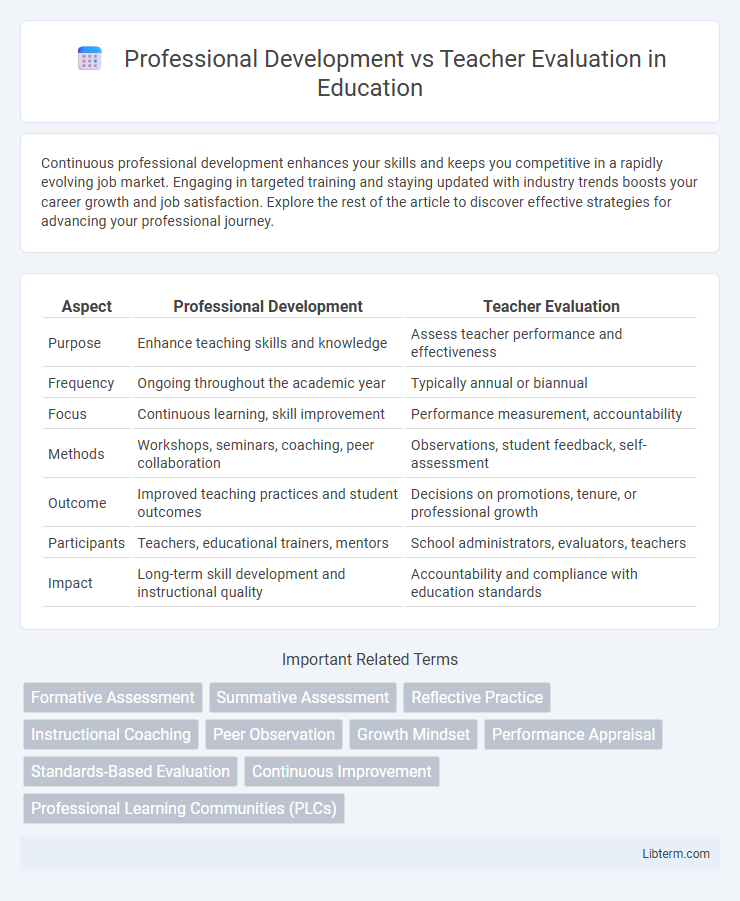Continuous professional development enhances your skills and keeps you competitive in a rapidly evolving job market. Engaging in targeted training and staying updated with industry trends boosts your career growth and job satisfaction. Explore the rest of the article to discover effective strategies for advancing your professional journey.
Table of Comparison
| Aspect | Professional Development | Teacher Evaluation |
|---|---|---|
| Purpose | Enhance teaching skills and knowledge | Assess teacher performance and effectiveness |
| Frequency | Ongoing throughout the academic year | Typically annual or biannual |
| Focus | Continuous learning, skill improvement | Performance measurement, accountability |
| Methods | Workshops, seminars, coaching, peer collaboration | Observations, student feedback, self-assessment |
| Outcome | Improved teaching practices and student outcomes | Decisions on promotions, tenure, or professional growth |
| Participants | Teachers, educational trainers, mentors | School administrators, evaluators, teachers |
| Impact | Long-term skill development and instructional quality | Accountability and compliance with education standards |
Introduction to Professional Development and Teacher Evaluation
Professional development equips educators with ongoing training and skill enhancement to improve teaching effectiveness and student outcomes. Teacher evaluation systematically assesses instructional performance through observations, student feedback, and performance metrics to ensure accountability and guide growth. Both processes are integral to fostering teacher excellence and supporting school improvement initiatives.
Defining Professional Development in Education
Professional development in education encompasses ongoing training and learning opportunities designed to enhance teachers' instructional skills and subject knowledge, fostering continuous growth and classroom effectiveness. It involves workshops, seminars, collaborative learning communities, and coaching aimed at aligning teaching practices with current educational standards and student needs. Unlike teacher evaluation, which assesses performance outcomes, professional development focuses on building capacity and improving pedagogical competencies over time.
Understanding Teacher Evaluation Systems
Teacher evaluation systems are designed to assess educators' performance based on specific criteria such as classroom management, instructional strategies, and student outcomes, providing a structured framework for accountability. Professional development aligns with these evaluations by targeting identified areas for growth through workshops, coaching, and ongoing training aimed at enhancing teacher effectiveness. Understanding the connection between evaluation metrics and tailored professional development initiatives is crucial for fostering continuous improvement and improving overall educational quality.
Key Purposes: Growth vs Accountability
Professional development emphasizes continuous growth by enhancing teaching skills and fostering innovative instructional practices that improve student outcomes. Teacher evaluation primarily serves accountability, ensuring educators meet performance standards, adhere to curricular goals, and contribute effectively to school goals. Balancing growth-oriented professional development with accountability-focused evaluations creates a comprehensive approach that supports both educator improvement and institutional performance.
Methods and Approaches in Professional Development
Professional development in education emphasizes collaborative learning methods, such as peer coaching, workshops, and action research, fostering continuous skill enhancement and reflective practice. Unlike teacher evaluation, which primarily uses formal assessments and performance appraisals to measure effectiveness, professional development relies on personalized, ongoing support tailored to educators' specific needs. Approaches like blended learning and mentorship programs promote adaptive teaching strategies and help teachers integrate new pedagogical techniques effectively.
Common Practices in Teacher Evaluation
Common practices in teacher evaluation emphasize classroom observations, student achievement data, and self-reflections to gauge instructional effectiveness. Evaluations commonly incorporate standardized test scores, peer reviews, and performance rubrics aligned with state teaching standards. Effective teacher evaluations integrate ongoing feedback and professional development plans tailored to individual teacher needs, fostering continuous instructional improvement.
Impact on Teacher Motivation and Performance
Professional development fosters teacher motivation by providing personalized growth opportunities, which positively influence instructional performance and student outcomes. Teacher evaluation, when implemented constructively, offers critical feedback that guides improvement but may reduce motivation if perceived as punitive. Balancing supportive professional development with fair evaluation systems enhances teacher efficacy and sustained performance gains.
Challenges and Controversies in Implementation
Professional development often faces challenges such as insufficient funding, time constraints, and lack of relevance to classroom realities, which hinder effective teacher growth. Teacher evaluation controversies frequently arise from perceptions of unfairness, overemphasis on standardized test scores, and inadequate feedback mechanisms that fail to support meaningful improvement. Both systems struggle with balancing accountability and support, impacting teacher morale and overall educational quality.
Integrating Professional Development with Evaluation
Integrating professional development with teacher evaluation enhances instructional quality by aligning growth opportunities with performance feedback. This approach allows educators to address specific areas for improvement identified during evaluations while fostering continuous skill advancement. Leveraging data-driven insights from evaluations ensures professional development is targeted, personalized, and effective in promoting student achievement.
Best Practices for Effective Teacher Growth
Implementing effective teacher growth requires integrating professional development with teacher evaluation to create a continuous feedback loop focused on skill enhancement and student outcomes. Best practices emphasize personalized coaching, data-driven goal setting, and collaborative reflection to address individual teacher needs and foster instructional improvement. Combining formative evaluations with targeted professional development opportunities ensures sustained teacher engagement and measurable progress in teaching effectiveness.
Professional Development Infographic

 libterm.com
libterm.com